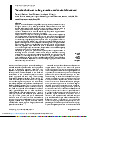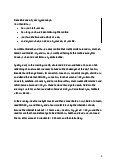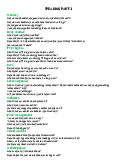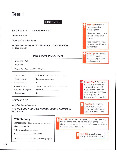



















Preview text:
IELTS SPEAKING FORECAST QUÝ 2/2022 PART 1 1. Dail routin
What is your daily study routine?
Have you ever changed your routine?
Do you think it is important to have a daily routine for your study?
What part of your day do you like best? 2. Ca
Did you enjoy traveling by car when you were a kid?
What types of cars do you like?
Do you prefer to be a driver or a passenger?
What do you usually do when there is a traffic jam? 3. Wesite
What kinds of websites do you often visit? What is your favorite website?
Are there any changes about the websites you often visit?
What kinds of websites are popular in your country? 4. Mobil phone
What was your first mobile phone?
Do you often use your mobile phone for texting or calls?
Will you buy a new one in the future?
How has your mobile phone changed your life? 5. Spot program
Do you like watching sports programs on TV?
Do you like to watch live sports games?
Who do you like to watch sports games with?
What kinds of games do you expect to watch in the future? 6. A Do you like drawing?
Do you like to go to the gallery?
Do you want to learn more about art?
Did you learn drawing when you were a kid? 7. Email Do you often send emails?
When would you send emails to others?
Is sending emails popular in Vietnam?
Do you think sending emails will be more or less popular in the future? 8. Dream
Can you remember the dreams you had?
Do you share your dreams with others? (or : Are you interested in others 8 dreams?)
Do you think dreams have special meanings?
Do you want to make your dreams come true? 9. Mirro
Do you like looking at yourself in the mirror? How often? Have you ever bought mirrors?
Do you usually take a mirror with you?
Would you use mirrors to decorate your room? 10. Ls an foun
What will you do if you find something lost by others?
Do you report to the police when finding something lost by others? Why? Have you ever lost things?
Will you post on social media if you lose your item? 11. Tim managemen
How do you plan your time in a day?
Is it easy to manage time for you?
When do you find it hard to allocate time? Do you like being busy? 12. Takin phot Do you like taking photos? Do you like taking selfies?
What is your favorite family photo?
Do you want to improve your photography skills? 13. Cinema
Did you usually go to the cinema when you were a kid?
Do you usually go to the cinema with friends?
Do you still enjoy watching the movies you loved as a child?
Do you prefer watching movies at home or at the cinema? 14. Stree marke
What do people usually buy on the street market?
Do you prefer to go shopping in the shopping mall or on the street market?
When was the last time you went to a street market?
Are there many street markets in China? 15. Hom/ accommodatio
What kind of house or flat do you want to live in in the future?
Are the transport facilities to your home very good?
Do you prefer living in a house or a flat?
Please describe the room you live in?
What part of your home do you like the most? How long have you lived there?
Do you plan to live there for a long time?
What9s the difference between where you are living now and where you lived in the past?
Can you describe the place where you live?
What room does your family spend most of the time in? 16. Hometow
Do you think you will continue living there for a long time?
Please describe your hometown a little?
How long have you been living there? Do you like your hometown? Do you like living there?
What do you like (most) about your hometown?
Is there anything you dislike about it? Where is your hometown?
Is that a big city or a small place?
What9s your hometown famous for?
Did you learn about the history of your home town at school?
17. Th are yo liv i
Where do you like to go in that area?
Do you know any famous people in your area?
What are some changes in the area recently?
Do you like the area that you live in? 18. Wor/Studie
What technology do you use at work?
What technology do you use when you study?
What subjects are you studying?
Why did you choose to study that subject? Do you like your subject? Is it very interesting?
Are you looking forward to working?
Do you prefer to study in the mornings or in the afternoons?
Why did you choose to do that type of work (or that job)? Do you like your job? Is it very interesting? Do you miss being a student? What work do you do?
Who helps you the most? And how? 19. Advetisemen
Are you interested in watching TV advertisements or internet advertisements?
What kinds of advertisements do you dislike?
Do you share advertisements with others?
Do you want to work in advertising in the future? 20. Borin thin
What kinds of things are boring to you?
What will you do when you feel bored?
What was the most boring thing you did when you were young? Do you think school is boring? 21. Collectin thin Do you collect things?
Are there any things you keep from childhood?
Would you keep old things for a long time? Why?
Where do you usually keep things you need? 22. Compute
In what conditions would you use a computer?
When was the first time you used a computer?
What would your life be like without computers?
In what conditions would it be difficult for you to use a computer? 23. Evenin tim
Do you like the morning or evening?
What do you usually do in the evening?
What did you do in the evening when you were little? Why?
Are there any differences between what you do in the evening now and what you did in the past? 24. Meetin place
Where is your favorite place to meet with your friends?
Do you think there are some places more suitable for meeting with others?
Are there any differences between your favorite meeting places in the present and in your childhood?
Why are some meeting places better than others? 25. Ol buildin
Have you ever seen some old buildings in the city?
Do you think we should preserve old buildings ?
Do you prefer living in an old building or a modern house?
Are there any old buildings you want to see in the future? Why? 26. Siin dow
Where is your favorite place to sit?
Do you always sit down for a long time?
Do you feel sleepy when you are sitting down?
When you were a kid, did you usually sit on the floor? 27. Talent
Do you have a talent or something you are good at?
Was it mastered recently or when you were young?
Do you think your talent can be useful for your future work? Why?
Do you think anyone in your family has the same talent? 28. Watc Do you wear a watch?
Have you ever got a watch as a gift?
Why do some people wear expensive watches?
Do you think it is important to wear a watch? Why?
29. Book an readin habit Do you often read books? When?
Are your reading habits now different than before?
Have you ever read a novel that has been adapted into a film?
Which do you prefer, reading books or watching movies? 30. Doin spot What sports do you like?
Where did you learn how to do it?
Did you do some sports when you were young?
Do you think students need more exercise? 31. Scienc Do you like science?
When did you start to learn about science?
Which science subject is interesting to you?
What kinds of interesting things have you done with science?
Do you like watching science TV programs?
Do you/Vietnamese people often visit science museums? PART 2+3
1. Describ tim whe someon aske fo you opinio. You should say: Who asked for your opinion?
Why did he/she want to know your opinion? What opinion did you give?
And explain how you felt when he/she asked for your opinion? Part 3 – Solicit opinions 1.
Why do some people dislike giving their opinions? 2.
Are there any apps designed for collecting opinions about products or services? 3.
Why do people like to express their opinions on the Internet nowadays? 4.
What are the disadvantages of sharing opinions on the Internet?
2. Describ diicul decisio tha yo mad an ha goo resul. You should say: What was the decision?
When did you make that decision? Why was it difficult to make?
And explain how you felt about the good result? Part 3 – Difficult decisions 1.
What kinds of decisions do young people have to make? 2.
Do you think young people are easily influenced by others while they make decisions? Why or why not? 3.
Do you think some people can make decisions without asking for advice from others? 4.
Do you think it9s necessary for kids to make as many decisions by themselves as they can?
3. Describ tim yo use you cellphon/smatphon t d somethin impotan. You should say: What happened? When it happened?
How important is the cellphone/smartphone?
And explain how you felt about the experience? Part 3 – Do important things
1. What do you usually do with a cellphone?
2. What are the differences between young people and old people when using a cellphone?
3. Which one is more important, using a cellphone to make phone calls or o read messages?
4. Do you think there should be a law to stop people from making phone calls in public?
4. Describ wa/chang tha hel yo sav lo of tim. You should say: What is it? How do you implement it? How difficult is it?
And explain how you feel about the way/change?
Part 3 – Time-saving method/change
1. What can people do to save time?
2. Does technology help people save time? How and why?
3. Do you think parents should be responsible for teaching children to save time?
4. Do people who can manage time well become successful more easily?
5. Describ frien yo lik t tal wit. You should say: Who he/she is?
What do you like to talk about?
Why do you like to talk with him/her?
And explain how you feel about him/her? Part 3 – Love to chat
1. Where do young people like to meet?
2. What do young people talk about when they meet up?
3. Do you think people should be honest when talking with friends?
4. On what occasions do people talk with strangers?
6. Describ tim whe yo wer stuc i trai ja. You should say: When did it happen? Where were you stuck? What did you do while waiting?
And explain how you felt in the traffic jam? Part 3 – Traffic congestion
1. How can we solve the traffic jam problem?
2. Do you think developing public transport can solve traffic jam problems?
3. Do you think the high ways will help reduce traffic jams?
4. What are good ways to manage traffic?
7. Describ a occasio whe someon gav yo psitiv advic
o suggestion abou you wor/stud. You should say: Who the person is? What did he/she said?
How has the advice/suggestion affected you?
And explain how you felt about the advice/suggestions?
Part 3 – Positive advice at work/study
1. When should parents encourage their children?
2. Should parents always encourage their children?
3. Do you think negative feedback is more important than positive feedback? Why?
4. Why is negative feedback as important as positive feedback at work or in study?
8. Describ a impotan rive/lak i you countr. You should say: Where is it located? How big/long is it? What does it look like?
And explain why it is important? Part 3 – Important
1. How can rivers and lakes benefit local people?
2. Do you think rivers and lakes attract tourists?
3. How do rivers and lakes affect local tourism?
4. Are rivers and lakes good for transport? Why?
9. Describ a interestin neighbo. You should say: Who he/she is? How did you know him/her? What do you do together?
And explain why he/she is interesting? Part 3 – Funny neighbor
1. Do you think people are familiar with their neighbors?
2. How can people improve the relationship with neighbors in a community?
3. How do children build relationships with others in a community?
4. Is it beneficial to get along well with neighbors?
10. Describ tim yo wer ver bus. You should say: When did it happen? Where you were? What you did do? And explain why you were busy?
Part 3 – very busy experience 1. Are you often busy?
2. What are the advantages and disadvantages when people keep busy?
3. Do you think children should learn through playing games or under pressure?
4. What kind of pressure people may experience at work?
11. Describ famil membe wh yo wan t wor wit i th futur. You should say: Who he/she is?
Whether you worked together before?
What kind of work would you like to do with him/her?
And explain how you feel about this family member?
Part 3 – the family who wants to
1. What kinds of family business are common in Vietnam?
2. Is it good to work with family members? Why?
3. Why do people want to do family business?
4. What benefits are there when working for big companies?
12. Describ contes/competitio yo woul lik t paticipat i. You should say:
What is the contest/competition about?
Where will the contest/competition take place? When will it be held?
And explain why you would like to participate in it? Part 3
1. What are the contests commonly seen on TV programs?
2. Why are competition shows popular?
3. What kinds of industries need competition? Why?
4. Do you think it is necessary to encourage people to compete with others in companies?
13. Describ somethin yo d tha ca hel yo concentrat o wor/stud. You should say: What is it?
How does it help you concentrate? When do you do it?
And explain how you feel about it? Part 3
1. Why is it more difficult for children to concentrate nowadays than in the past?
2. Do you think technology will harm children's ability to concentrate?
3. What kinds of jobs require high concentration at work?
4. Can exercise help people improve concentration?
14. Describ somethin tha surprise yo. You should say: What is it? How did you find out about it? What you did do?
And explain whether it made you happy?
Part 3 – things that surprise
1. How do people express happiness in your cult culture?
2. Do you think happiness has any effect on people? How? 3. How can people be happy?
4. Is it good for people to be unhappy? Why?
15. Describ a impotan even yo celebrate. You should say: What the event was? When did it happen? Who attended the event?
And explain how you felt about the event? Part 3 – events that have
1. Do you like to celebrate important events? Why?
2. What kinds of events do people usually celebrate?
3. Do people often celebrate events with a large group of people or just a few people?
4. Do people often celebrate festivals with families?
16. Describ popula/wel-know peso i you countr. You should say: Who is this person? What have they done? Why is he/she popular?
And explain how you feel about this person? Part 3
1. What kinds of people are popular at work?
2. Are bosses more popular than employees at work?
3. Which one is more important, keeping a good relationship with colleagues or doing well at work?
4. What benefits are there when a child is popular at school?
17. Describ psitiv chang tha yo mad i you lif. You should say: What is it? Why you did it? Who do you do it with?
And explain how you feel about the change? Part 3 – positive change
1. Is it easier for young people to change?
2. Is it easy for old people to change?
3. How can people change their daily routine if they want to?
4. What are the disadvantages when people keep making changes?
18. Describ specia da ou tha cs yo lil mone/did’ cs yo muc. You should say: When the day was? Where you go? How much do you spend?
And explain how you feel about the day? Part 3 – A low-cost outing
1. Do people like to spend their leisure time out in your country?
2. How do people spend their leisure time in your country?
3. How does technology affect the way people spend their leisure time?
4. Do you think only old people have time for leisure?
19. Describ a inventio tha ha change th worl i psitiv wa. You should say: What it is? What benefits has it brought?
How does it influence people of different ages?
And explain how it changed people9s lives? Part 3
1. What is the most helpful innovation at home?
2. What household appliances make us lazy?
3. What kind of invention can be used at school?
4. Do you think Al will replace human teachers? Why?
20. Describ a occasio tha yo ls somethin. You should say: What you lost?
When and where did you lose it? What did you do to find it?
And explain how you felt about it? Part 3
1. What kinds of things do people usually lose?
2. What do people often do when losing things?
3. Is it an effective way to use rewards to find lost things?
4. What kinds of people may lose things often?
21. Describ traditiona produc i you countr. You should say : What is it?
When did you try this product for the first time? What it is made of?
And explain how you feel about it? Part 3 – traditional product
1. Why are traditional products important?
2. Do you think tradition is important for a country? Why?
3. What are the traditional Chinese products?
4. Why is it important for children to learn about traditional products?
22. Describ somethin yo d t kee fi an health. You should say: What it is When you do it? Who do you do it with?
Why is it important to keep fit and healthy?
And explain why it can help you keep fit and healthy? Part 3 – health care
1. How do children and old people keep fit and healthy?
2. What do people normally do to keep fit and healthy in your country?
3. How can parents help and guide their kids to keep healthy?
4. Do you think it is good for governments to utilize popular celebrities to help build health awareness?
23. Describ tim whe yo helpe chil. You should say: When it was? How did you help him/her? Why do you help him/her? And how did you feel about it? Part 3 – help children
1. Do you often help kids? How?
2. Why is it necessary to do volunteer services?
3. What can schools do to develop students' awareness of volunteering?
4. Who benefit more from the volunteer services, the volunteers or the people helped?
24. Describ quie plac yo lik t g. You should say: Where it is? How you knew it? How often you go there? What you do there?
And explain how you feel about the place? Part 3 – quiet place
1. Is it easy to find quiet places in your country? Why?
2. Why do old people prefer to live in quiet places?
3. Why are there more noises made at home now than in the past?
4. Why do some people like to use noise as background sound when they are working or studying?
25. Describ a ambitio tha yo have’ achieve. You should say: What it is? Why haven9t you achieved it? What you did? And how did you feel about it?
Part 3 – Unfulfilled ambition
1. What ambitions do children usually have?
2. Why are some people very ambitious in their work?
3. Why don't some people have dreams?
4. How do people balance work and life?
26. Describ lon wal yo eve ha. You should say: When did this happen? Where you walked? Who you were with?
And explain how you felt about this long walk? Part 3 – long distance walk
1. What outdoor activities do people like?
2. What are the differences between the outdoor activities children did in the past and now?
3. Is leisure time important to everyone? Why?
4. Do women have more leisure time than men?
27. Describ thin yo di t lear anothe languag. You should say: What language did you learn? What you did?
How did it help you learn the language? And how did you feel about it? Part 3 – Language learning
1. What difficulties do people face when learning a language?
2. Do you think language learning is important? Why?
3. Which is better, to study alone or to study in a group? Why?
4. What's the best way to learn a language?
28. Describ a interestin discussio yo ha wit you frien. You should say: What was the discussion about?
What opinions do you and your friend have?
Why do you think the discussion was interesting? And how did you feel about it? Part 3
1. When do children normally form their own views?
2. Do children have strong opinions?
3. Should parents request their kids to obey them?
4. In what industries do you think communication is a necessary skill?
29. Describ a interestin son. You should say: What the song is? What story does the song tell? Whether the song is popular?
And explain why you think it is interesting? Part 3 – funny song
1. Why are many music competitions popular in Vietnam?
2. What kinds of music do young people like?
3. What kinds of people like traditional music?
4. What are the differences between live concert and online concert?
30. Describ cit tha yo thin i ver interestin. You should say: Where it is? What is it famous for? How did you know this city?
And explain why you think it is very interesting?



